By Lucy Komisar
Consider a play where the villain is a Jewish banker who demands the murder of a client who can’t pay his debt. Is this a TV crime show picking up on the current hostility toward Goldman Sachs? No, take it back more than four centuries. Shakespeare’s play is believed to have been written between 1596 and 98, so there wasn’t any financial crisis going on, that we know about.
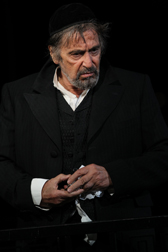
What’s fascinating about the play and Al Pacino’s dazzling portrayal of the banker, Shylock, is the sociological take of a time when
¢ Jews were reviled;
¢ Jews were bankers (money-lenders) because Christians were told by their church they couldn’t do it;
¢ Christians borrowed from the Jews when they needed money;
¢ Christian reviled the Jews for lending to them.
Go figure. It would make a good TV drama. And it is luminous Shakespeare as directed by Daniel Sullivan in the ethereal venue of Central Park’s Delacorte Theater with a set that is a curious confection of concentric round metal railings that move to create a higher tower, grids, a cage, and the walls that surround mahogany desks.
The immediate plot is that Antonio, owner of a fleet of ships, needs to borrow 3000 ducats to help his friend Bassanio lay suit to the beautiful Portia (Lily Rabe). ….you spat on me ….You call’d me”dog; and for these courtesies I’ll lend you thus much moneys? inquires Shylock. Pacino plays him with a demeanor that tells you this is a member of the despised class who survives by playing to the weakness of the upper class. I’ll lend you money, Shylock tells Antonio, but if he doesn’t pay, the forfeit is a pound of flesh.
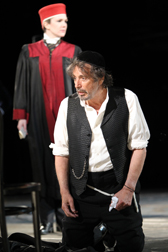
Fascinating in the age of lawyering (or maybe it was always the lawyers’ age) how the lawyer played by a disguised Portia figures out that you can’t take the flesh without spilling blood, and spilling Christian blood is a crime. So the Jew couldn’t win. Fascinating the moment when Shylock, forced to become Christian or die, challenges the quality of Venetian justice by pointing out that his accusers have slaves.
The audience wins every moment that Pacino is on stage. He is a slightly hunched figure with an accent that calls up Eastern European/Russian Jews living on the Lower East Side or Brooklyn. He is so utterly natural that you could meet him on Delancey or Rivington Street. Nobody wonders why a 16th century Venetian money-lender is speaking with that accent; it just works to make him a familiar link to the historical Jewish past. When he talks about business on the Rialto (the famous bridge over one of the city’s canals), you can hear him saying Park Avenue or Wall Street.
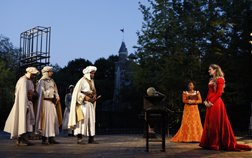
It is somehow more obtrusive that Portia’s suitors, the prince of Morocco (Nyambi Nyambi) has an Arabic trill or the Prince of Aragon (Max Wright) has the throaty Spanish h.
Sullivan’s immensely accessible production makes you think about Shakespeare’s message and how it might have been received at the time. Pacino’s Shylock is as sympathetic as you can get about a guy who, battered by anti-Semitism that has made him hard and unforgiving, seeks a gruesome revenge. You imagine it’s the reason why even his daughter Jessica (talk about a thankless child) elopes, carrying off his moneybox and jewels, to convert and marry a Christian. Unfortunately Heather Lind doesn’t provide any depth to that role, nor does Bill Heck offer up a spark as her suitor Lorenzo.
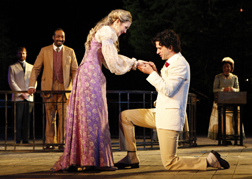
However Hamish Linklater as Bassanio is wonderfully laid back, alternately cool and fidgety, always a delight. When he wears a white suit with a red boutonniere, he has a gait like a sport. You want to know him.
The biggest disappointment is Lily Rabe as Portia, the love object that prompts Bassanio to get Antonio to borrow the unfortunate 3000 ducats. We first see her coming down off a perch after a flash ends her photo shoot. She seems as bored with Bassanio and the people who inhabit the drama of her life as some modern model might be. You don’t want to know her.
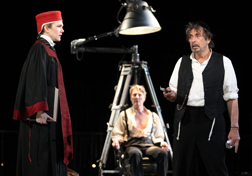
On a par with Pacino in his lesser role, Byron Jennings portrays Antonio as a subtle, moving, very human character who changes from an honest businessman (there’s a rare bird) to a man willing to take his punishment for a bad deal (another rare bird).
Nyami Nyami is rather odd as the Prince of Morocco. He seems more a street fool than a self-absorbed potentate. Jesse Tyler Ferguson is good and believable as Launcelot Gobbo, the Shylock employee who betrays the boss.
Minor quibbles about minor faults. Sullivan’s production and Pacino’s performance are memorable events that underline the complexity and depth of Shakespeare’s understanding and critique of the times.
The Merchant of Venice.
Written by William Shakespeare; directed by Daniel Sullivan.
The Public Theater at the Delacorte Theater, entrance Central Park West at 81st Street or Fifth Avenue at 79th Street, New York City.
212-967-7555.
Opened June 30; closes August 1, 2010.
http://www.shakespeareinthepark.org/. http://www.publictheater.org/.

